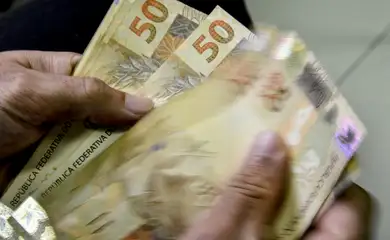Millions of Brazilians hard-pressed to make ends meet

Following the onset of the COVID-19 pandemic, Guilherme Nogueira, 28, has had to make do to the best of his abilities to eke out a living for himself and his son. Today, he sells backpacks on a tarp on the sidewalk of a busy thoroughfare in downtown Rio de Janeiro. After 2020, he was unable to find formal employment.

“Sales are OK some days, not so much on others. I get to sell some five, eight backpacks sometimes, but on other days not more than two. It’s not easy. The officers are always coming to [seize] the backpacks,” he said wistfully.
Losing his formal job led to a problem familiar to 66 million Brazilians today, as per data from the country’s shop managers association CNDL: More and more young people have been unable to evade indebtedness.
Without a stable source of income, Nogueira cannot pay off his credit card debts. “I couldn’t afford to pay the bank. I got a credit card and I didn’t have money to pay on the spot. I have credit card debts from two banks,” he noted. “I don’t have any special payment plan to clear them. Things have been tough.”
Four out of ten Brazilian adults are reported to struggle with overdue bills.
The number of outstanding debts in April this year surged 18.42 percent from the same span last year. Debt owed to banks is the top reason for default: 63.8 percent of the total.
Like Nogueira, defaulting Brazilians owe money to two institutions on average. Almost half of the Brazilians in the street vendor’s age group (25–29) are in arrears.
The issue is not restricted to the young, however, nor are banks the only source of hard-to-pay debt. José Raimundo, 67, is also self-employed, and has worked for years as a shoeshine man a few meters from the spot where Nogueira sells his backpacks.
The elderly
Just like his fellow vendor, Raimundo was greatly impacted by the pandemic. Still unable to obtain retirement payments, he has applied for an elderly welfare program but approval is still pending. Raimundo lost a large portion of the clientele when COVID-19 started.
“The pandemic forced me to stay home for almost two years. Then, I got sick and couldn’t do anything. I was out of employment for three years, which really pushed things back. My wife alone got us covered: water, electricity, phone bills. Water came last. As soon as the welfare money’s out, I’ll talk to the utility company and try to settle with installments. I don’t want to owe anyone anything. Being a bad payer is not my nature,” said the shoeshine man, who has recently resumed his trade.
Three of every four elderly people aged 65–84 are in arrears all across Brazil. Water and electricity account for 11.1 percent of default cases, not far from commerce, which represents 11.6 percent of unpaid debts.
Those with formal jobs are often not spared. Alessandro Gonçalves is 30 years old and works as a doorman in an office building in downtown Rio.
Every month he has to bend over backward to ensure his money meets his daily needs, which often includes delaying the payment of some utility bills. “The struggle is routine; you have bills to pay but you can’t. After the month’s over the money comes in, but you can’t.”
Dwindling income
According to CNDL financial specialist Merula Borges, a shrinking income is among the chief drivers leading Brazilians into default.
“In the survey, when people were asked what brought them into into default, they said they had lost their own income,” she noted. “That’s understandable. When income is lower, essential items tend to take up more space in the family budget and people are less prepared to deal with any unforeseen events.”
Borges argues public policies are needed to help Brazilians make ends meet.
The government is devising a program to have 37 million citizens choose a plan to clear approximately BRL 50 billion in debt.



